
Why Bristol Communcations & Electrical Ltd for your CCTV Installation?
Professional Commercial CCTV Installation in Bristol, Bath, and the Surrounding Areas – Quality You Can Trust | Bristol Communications and Electrical
At Bristol Communications and Electrical, we specialise in professional commercial CCTV installation across Bristol, Bath, and the surrounding areas. We exclusively use high-quality Hikvision CCTV cameras and equipment, ensuring reliable security that stands the test of time for businesses of all sizes.
Our CCTV systems are designed to be future-proof, offering flexibility for upgrades and expansion as technology advances. We provide tailored security solutions for a wide range of commercial settings, including:
🛠️ Car Garages and Workshops
🍽️ Restaurants and Cafés
🏪 Shops and Retail Spaces
🏢 Offices and Business Parks
🏫 Schools and Educational Facilities
Located just outside Bristol, we proudly serve businesses in Bristol, Bath, and the surrounding areas, including Keynsham, Yate, Portishead, and more. Trust Bristol Communications and Electrical for professional, high-standard CCTV installations that prioritise your security and peace of mind.
Why Choose Bristol Communications and Electrical for Your Commercial CCTV Installation?
✅ High-Quality Hikvision Cameras
✅ Future-Proof Systems for Easy Upgrades
✅ Professional, Local Service in Bristol, Bath, and the Surrounding Areas
✅ Tailored Security Solutions for Businesses
Contact us today for a free quote or to learn more about how we can secure your commercial property.
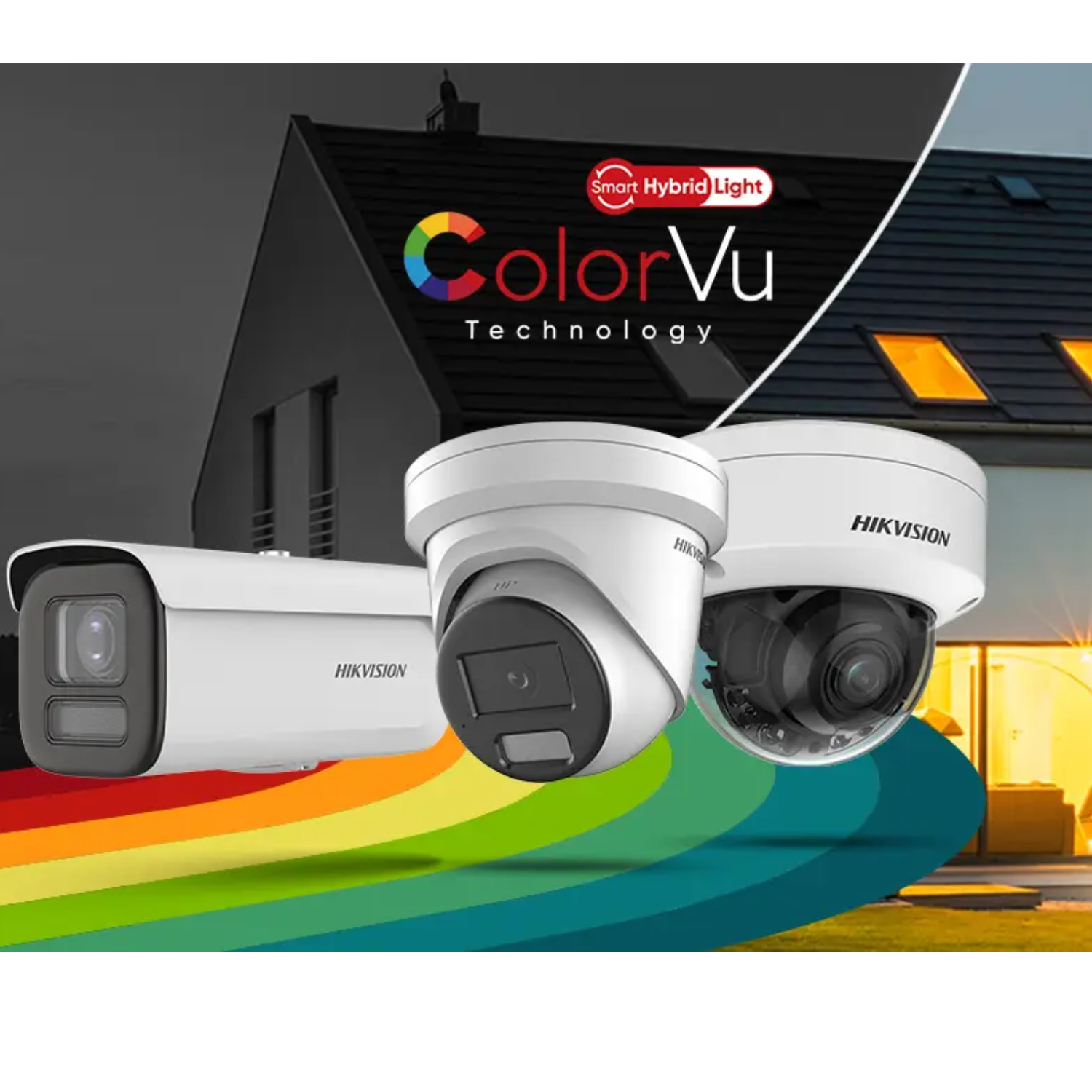
CCTV Installation Bristol, CCTV Bath, CCTV Installers, Supply and Installation, for your Home or Business
Expert Commercial CCTV Installation in Bristol, Bath, and Surrounding Areas | Bristol Communications & Electrical
If you're looking for professional commercial CCTV installation in Bristol, Bath, and the surrounding areas, trust the experts at Bristol Communications & Electrical. We specialise in reliable, high-quality CCTV installations for businesses of all sizes, providing peace of mind with every system we install.
Our team of skilled CCTV installers has extensive experience working with industry-leading Hikvision CCTV equipment, including:
📹 IP CCTV Cameras
📀 CCTV NVRs (Network Video Recorders)
💾 CCTV DVRs (Digital Video Recorders)
Whether you need CCTV for a restaurant, industrial unit, car garage, shop, gym, or any other type of commercial property, we offer personalised solutions tailored to your specific security needs. From small retail spaces to large commercial units, we can design and install a CCTV system that keeps your business secure.
Why Choose Bristol Communications & Electrical for Your CCTV Installation?
✅ Experienced, Professional CCTV Installers
✅ High-Quality Hikvision Equipment
✅ Tailored Solutions for Commercial Properties
✅ Reliable, Future-Proof Security Systems
✅ Covering Bristol, Bath, and the Surrounding Areas
📞 Call us today on 01761 452997 to book your free consultation or to learn more about our commercial CCTV installation services. Don't wait – protect your business with a trusted, local security expert!

Get a CCTV Kit Installed in Bristol or Bath and Get the following
Comprehensive CCTV Installation Packages in Bristol and Bath – Included with Every Installation
When you choose Bristol Communications & Electrical for your CCTV installation in Bristol, Bath, and the surrounding areas, you get more than just high-quality equipment. Every installation comes with:
✅ Free Mobile and Tablet App – Easily monitor your CCTV system from your smartphone, tablet, desktop, laptop, or Mac.
🌐 Remote Access Anywhere – View your cameras from anywhere in the world – perfect for business owners on the move.
👷 Expert Installation and Professional Training – Installed by experienced technicians with full training included, so you know exactly how to use your system.
🛡️ 1-Year Warranty – Peace of mind with a full one-year warranty on all equipment and installation.
🧹 Tidy, Professional Work Guaranteed – We leave every site clean and clutter-free, ensuring a professional finish every time.
📞 Call us today on 01761 452997 or Contact us for a free, no-obligation quote. Secure your property with the experts.
CCTV Cameras we install and maintain in Bristol and Bath
-
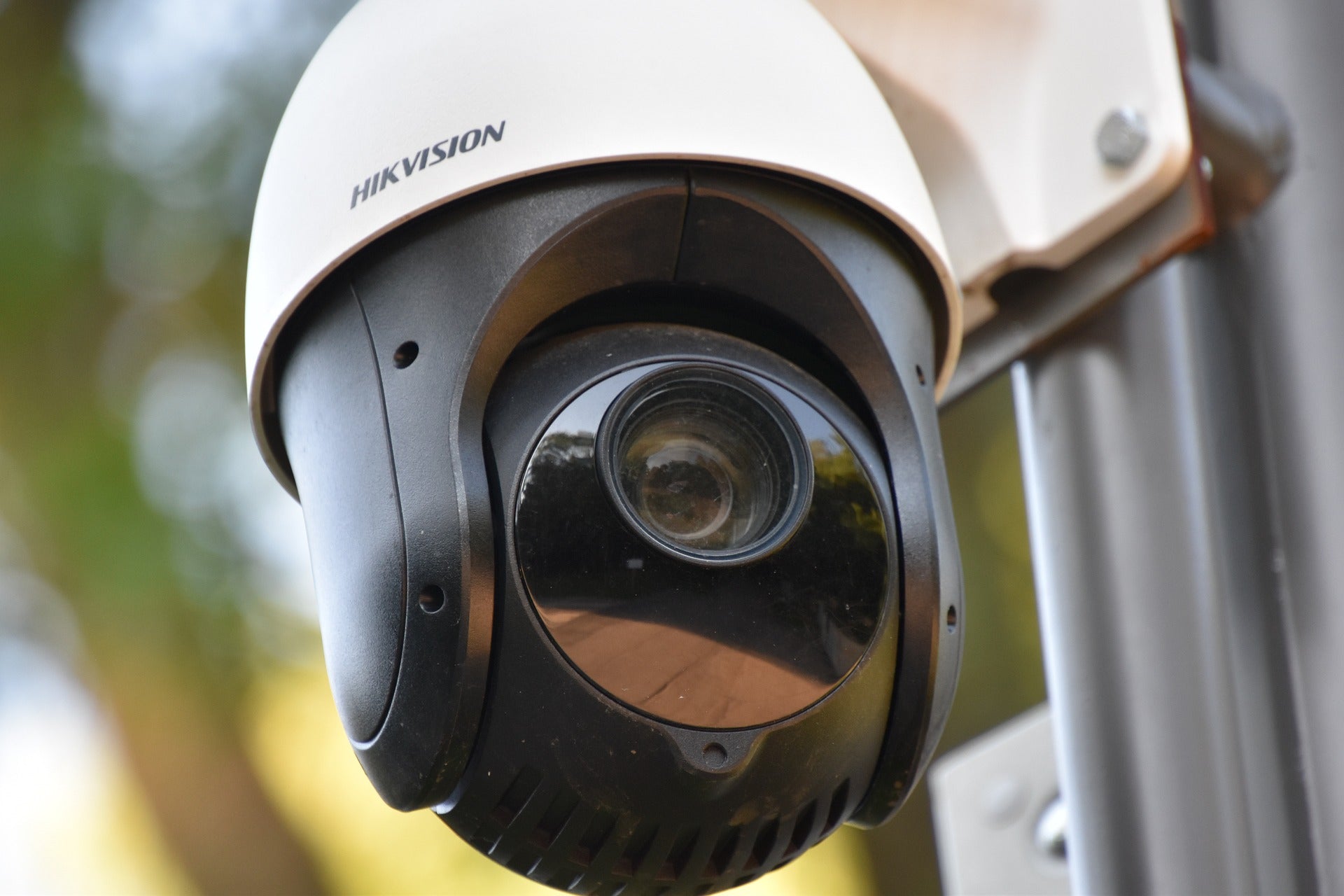
Pan Tilt and Zoom Camera Installation
A PTZ (Pan-Tilt-Zoom) camera is a type of security camera that offers a range of movement options, allowing for a wide area of coverage. It can pan (move left or right), tilt (move up or down), and zoom (adjust the lens to make the subject appear closer or farther away), either manually via remote control or automatically through preset patterns and schedules. This flexibility, combined with high-quality imaging capabilities, makes PTZ cameras ideal for monitoring large areas and tracking movements in real-time.
-
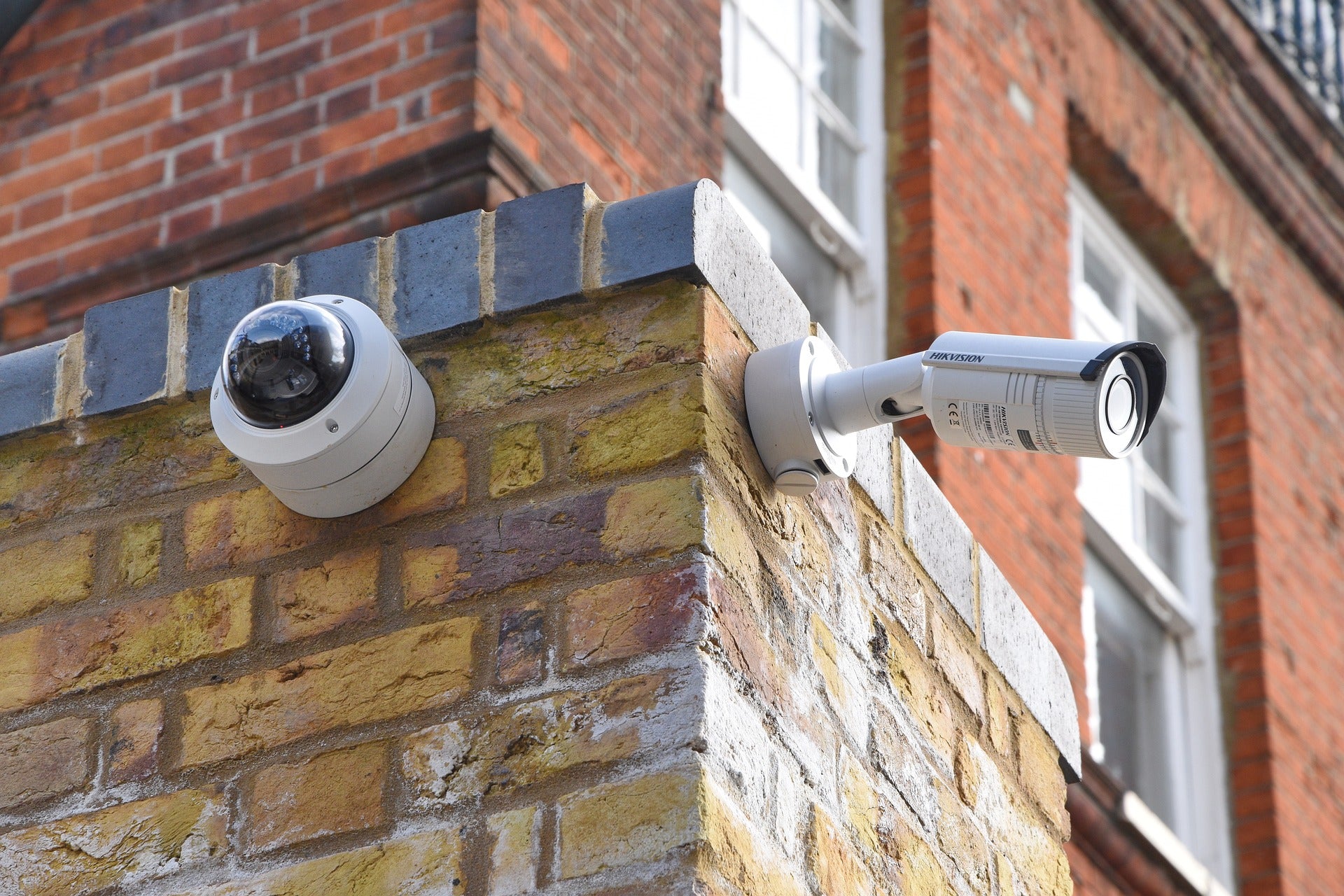
Bullet and Domes Installation
A bullet camera is a type of security camera that is cylindrical in shape, resembling a bullet shell or a lipstick tube. These cameras are typically used for long-distance viewing and can be mounted on walls or ceilings. They are known for their straightforward installation and directional view, which means they point in a single direction once installed.
On the other hand, a dome camera is a type of security camera encased in a dome-shaped housing, hence the name. This design allows the camera to rotate and cover a wider field of view. Dome cameras are often used in indoor environments and are more discreet compared to other camera types
-
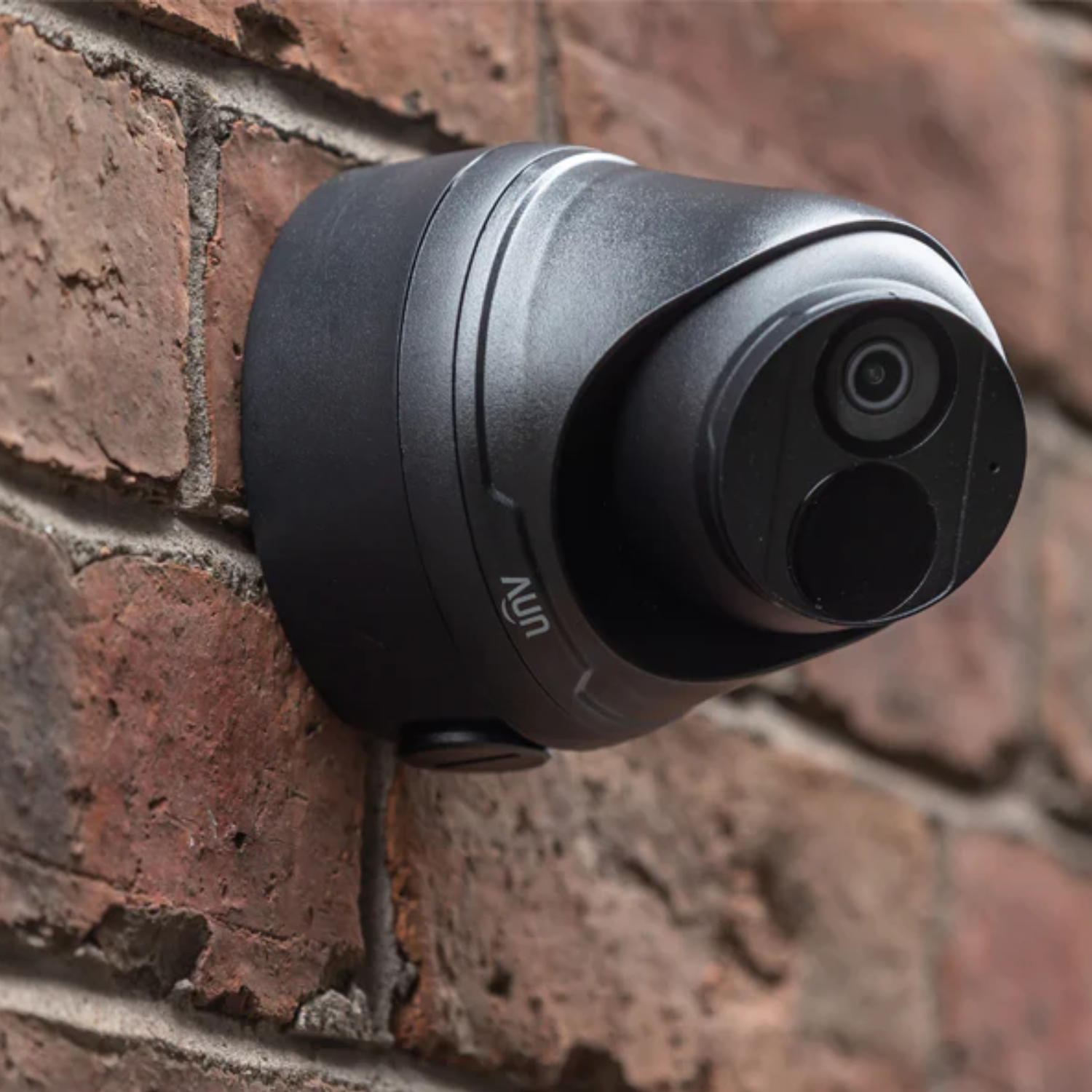
Turret Camera Installation
A turret camera, also known as an eyeball camera, is a type of security camera that features a compact, ball-and-socket design. This design allows the camera lens and the IR illuminators to rotate freely in the "eyeball" casing, providing flexibility for the direction of view. Turret cameras are versatile and can be mounted on walls or ceilings. They offer a balance between the discreet profile of dome cameras and the straightforward installation and adjustment of bullet cameras, making them popular for various surveillance applications. Furthermore, turret cameras are often designed to reduce the effect of IR glare and reflection, thereby providing good night vision capabilities.


Bristol and Bath CCTV Installation.
CCTV Installation Services in Bristol, Bath, and Surrounding Areas
At Bristol Communications & Electrical, we provide professional CCTV installation services across Bristol, Bath, and the surrounding areas. Whether you're upgrading an existing CCTV system or need a brand-new solution for your shop, restaurant, industrial unit, business, or commercial property, we've got you covered.
Our expert team can design and install CCTV systems tailored to your specific security needs, ensuring your property is protected with the latest technology.
🔒 Secure your property today – click the "Get a Quote" button below for a free, no-obligation quote.
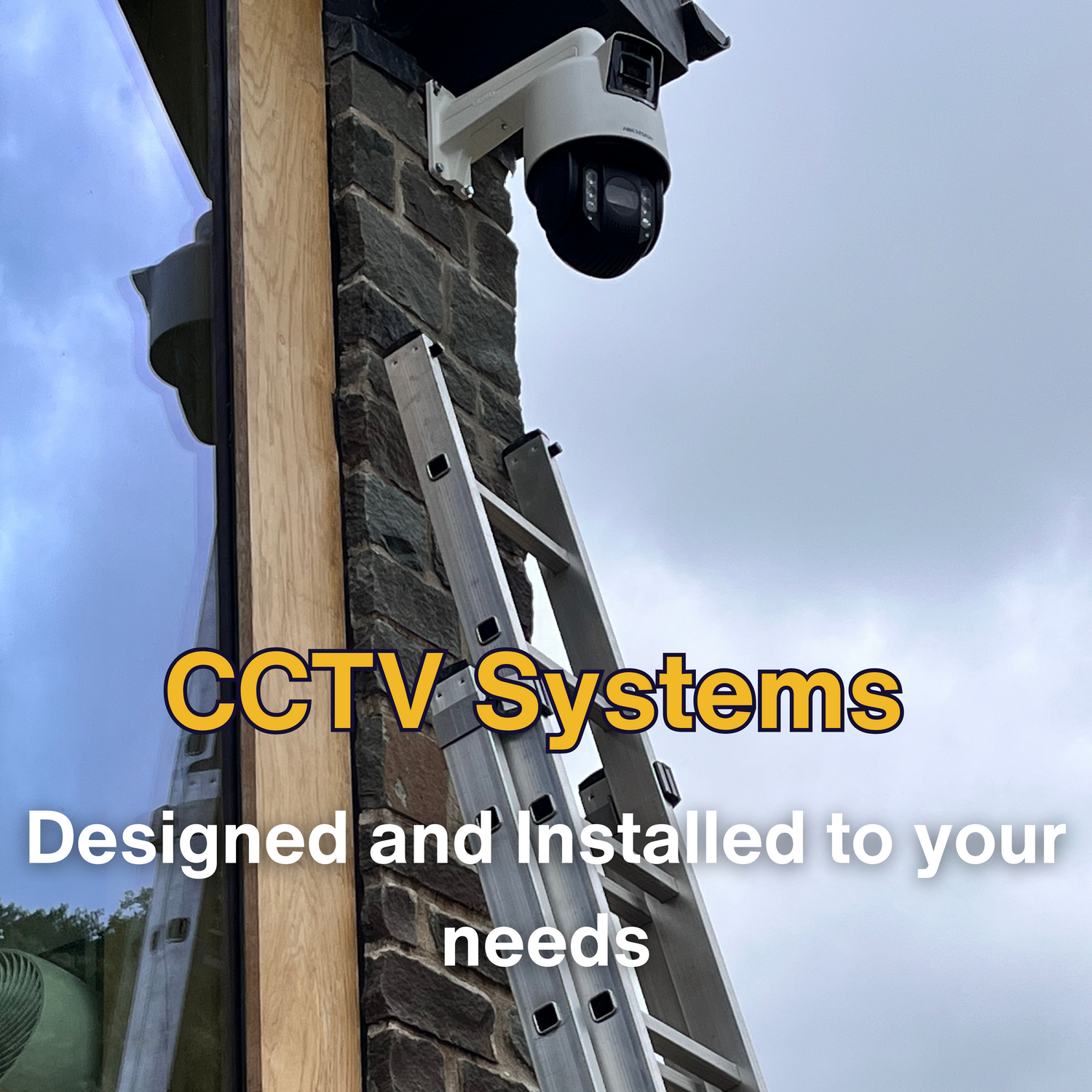
CCTV Systems Bristol and Bath
Custom CCTV Systems Designed for Your Needs – Serving Bristol, Bath, and Surrounding Areas
At Bristol Communications & Electrical, our CCTV systems are custom-designed and professionally installed to meet your specific security requirements. Whether you need a single camera for your driveway or a multi-camera system covering every aisle of your store, we have the right CCTV solution for you.
We provide reliable, high-quality CCTV systems for businesses throughout Bristol, Bath, and the surrounding areas, ensuring your property is protected with cutting-edge security technology.
📞 Contact us today to discuss your CCTV needs or click the "Get a Quote" button below for a free, no-obligation quote.

Why have CCTV Installation in Bristol or Bath?
Why do you need CCTV here in Bristol and Bath?
Protect Your Business with Professional CCTV Installation in Bristol and Bath
Installing a CCTV system in Bristol, Bath, and the surrounding areas is one of the most effective ways to protect your property and deter criminal activity. With crime on the rise, investing in a high-quality CCTV system is a smart preventative measure that provides peace of mind for business owners.
At Bristol Communications & Electrical, we offer advanced CCTV systems that go beyond just recording footage. Our solutions include:
🔔 Instant Alerts – Receive real-time notifications if someone is on your property.
🎙️ Two-Way Audio – Communicate directly through your cameras for added security.
👁️ 24/7 Monitoring – Keep an eye on your property day and night, from anywhere in the world.
From shops, restaurants, industrial units, car garages, to retail outlets of all sizes, businesses trust our CCTV systems to prevent crime before it happens.
📞 Give us a call or click the "Get a Quote" button below for a sensible price on professional CCTV installation. Protect your business today.
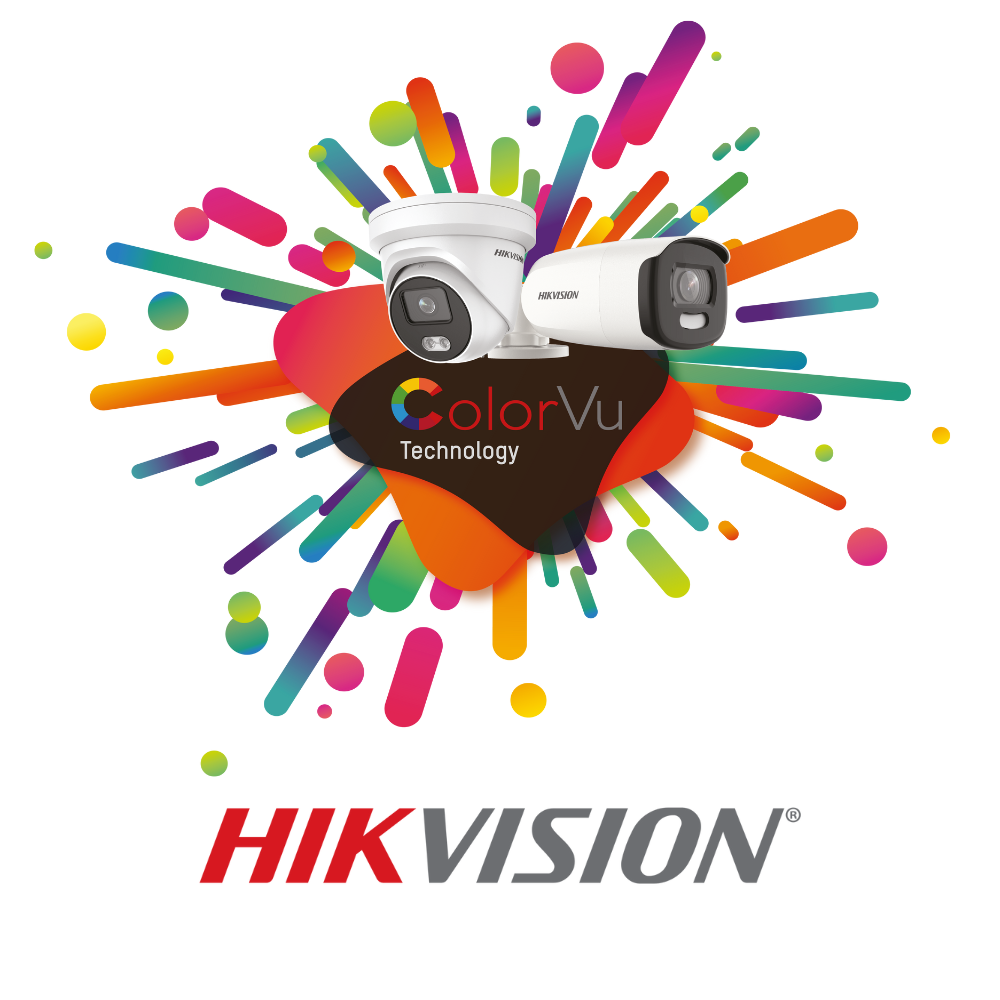
Which CCTV System?
CCTV We Install
Professional CCTV Installation in Bristol and Bath – Specialists in Hikvision Systems
At Bristol Communications and Electrical Ltd, we specialise in professional CCTV installation using industry-leading Hikvision systems. While we can provide a range of brands, we find Hikvision offers the best combination of quality, reliability, and value for money – making it our go-to choice for most installations.
Why Choose Hikvision for Your CCTV System?
✅ Exceptional Reliability – Built to last with a long service life, even in demanding environments.
🎥 4K ColorVu Cameras – Full-colour video, even at night, for enhanced security and clearer footage.
💾 Security-Grade Hard Drives – Optimised for continuous recording and long-term reliability.
📱 Advanced Features – Remote access, instant alerts, and two-way audio options available.
All of the CCTV cameras we install are high-quality, designed to provide peace of mind and excellent performance. Whether you need a single camera or a comprehensive multi-camera system, we can supply and install the right solution for your property.
📞 Get in touch with us today for a free, no-obligation quote or click the "Get a Quote" button below to learn more about our CCTV installation services.

Did somebody say 4K?
4K
4K Ultra HD CCTV Installation in Bristol and Bath – Crystal Clear Security
At Bristol Communications and Electrical Ltd, we prioritise quality in every CCTV installation we complete in Bristol, Bath, and the surrounding areas. That's why all our CCTV systems are capable of 4K Ultra HD resolution, ensuring you get the sharpest, most detailed footage possible.
Why Choose 4K Ultra HD CCTV?
✅ Exceptional Image Clarity – Capture crucial details like faces, number plates, and important movements, even at a distance.
🔍 Future-Proof Technology – Stay ahead as technology advances with high-resolution video that won't become outdated quickly.
🌙 Superior Low-Light Performance – Pair with 4K ColorVu cameras for full-colour night vision and unmatched clarity in low light.
We rarely recommend anything less than Ultra HD 4K cameras unless there is a specific need for a different solution, as we believe this is the best way to protect your property with confidence.
📞 Contact us today or click the "Get a Quote" button below to discuss your CCTV requirements and get a free, no-obligation quote.
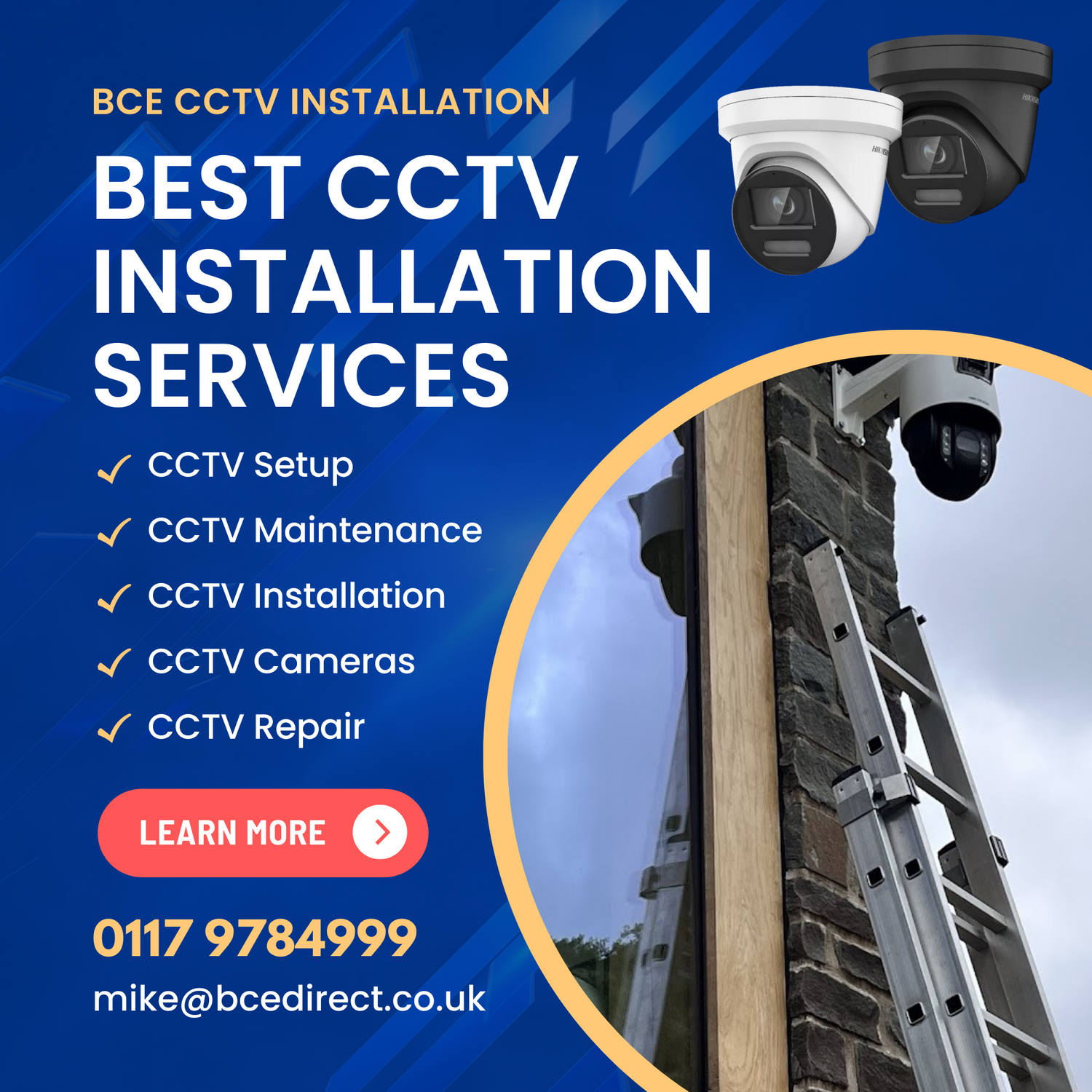
Different Types of CCTV Installation
Which CCTV do you choose?
Reliable CCTV Installation for All Property Types – Bristol, Bath, and Surrounding Areas
With so many CCTV options on the market, choosing the right system for your property can be overwhelming. At Bristol Communications and Electrical Ltd (BCE), we specialise in hardwired CCTV systems that provide reliable, high-quality surveillance without the common issues associated with Wi-Fi cameras, like poor battery life and security vulnerabilities.
Why Choose BCE for Your CCTV Installation?
✅ Hardwired for Reliability – Secure, stable connections with no interference or dropped signals.
🌐 Remote Access – View live footage and playback recordings from anywhere in the world.
🎥 Professional-Grade Equipment – We only install tried and tested CCTV systems, including 4K Ultra HD cameras for crystal-clear video.
🛠️ Bespoke Solutions – Tailored CCTV systems for every type of property, including:
No matter the size or type of property, our bespoke CCTV solutions are designed to meet your specific security needs, providing peace of mind 24/7.
📞 Contact us today for a free, no-obligation quote or click the "Get a Quote" button below to discuss your CCTV requirements.

CCTV Remote Viewing
Free Remote Viewing with Every CCTV Installation – Bristol and Bath
At Bristol Communications and Electrical Ltd, every CCTV installation includes FREE remote viewing as standard. We exclusively use high-quality Hikvision CCTV equipment, making the Hik-Connect App the perfect choice for secure, real-time access to your CCTV cameras from anywhere in the world.
Why Choose Our CCTV Systems?
✅ Live Viewing and Playback – Monitor your property in real-time or review recorded footage anytime.
🌍 Global Access – View your CCTV system from anywhere with an internet connection.
💰 No Ongoing Costs – Unlike some systems, our remote viewing service is completely free – no monthly fees or hidden charges.
📱 Easy to Use – The Hik-Connect App is user-friendly, reliable, and packed with features to keep your property secure.
With no ongoing costs and full access to your cameras 24/7, our CCTV systems offer excellent value and peace of mind.
📞 Contact us today or click the "Get a Quote" button below for a free, no-obligation quote on professional CCTV installation.

Remote Access
Hassle-Free Remote Access for Your CCTV System – Bristol and Bath
At Bristol Communications and Electrical Ltd, all of our CCTV installations come with secure remote access free for one month. This powerful feature allows you to monitor your property from anywhere, while also providing a convenient way for our engineers to assist you without the need for a site visit.
Why Choose Remote Access for Your CCTV System?
✅ Instant Adjustments – Easily tweak your settings without waiting for an engineer to visit.
🔒 Secure and Private – We can only access your CCTV system with your explicit permission, ensuring your security and privacy.
📱 Convenient Control – Manage your cameras, playback footage, and receive alerts from anywhere in the world.
⚙️ Seamless Support – Faster, more efficient support when you need it most.
When we set up your CCTV system, we can add you to our remote access platform for ongoing peace of mind and quick adjustments as your security needs change.
📞 Contact us today or click the "Get a Quote" button below to learn more about our professional CCTV installation services.
What do we do?
Our CCTV Installation Process – Bristol and Bath
At Bristol Communications and Electrical Ltd, we make CCTV installation straightforward and hassle-free. Here’s what to expect when you choose us for your security needs:
📞 Contact us today or click the "Get a Quote" button below to discuss your CCTV requirements and book a free consultation.
CCTV installation bristol and bath
Contact form
Areas We Install CCTV Across Bristol and Bath
Get in touch-
CCTV Installation
- Almondsbury
- Alveston
- Avonmouth
- Ashley Down
- Barr's Court
- Bedminster
- Bedminster Down
- Bishopston
- Bishops Sutton
- Bitton
- Blagdon
- Bradley Stoke
- Brislington
- Bromley Heath
-
CCTV Installers
- Cheddar
- Chelwood
- Chewton Mendip
- Chew Valley
- Chew Magna
- Chew Stoke
- Churchill
- Clevedon
- Clutton
- Clifton
- Chipping Sodbury
- Coalpit Heath
- Compton Martin
- Cotham
-
CCTV Repair
- Downend
- Easton
- East Harptree
- Eastville
- Emerson's Green
- Faulkland
- Farmborough
- Farrington Gurney
- Felton
- Filton
- Framton Cotterell
- Frenchay
-
CCTV Maintenance
- Hallatrow
- Hanham
- Henleaze
- Headley Park
- Hinton Blewett
- High Littleton
- Horfield
- Kingswood
- Keynsham
- Knowle
- Longwell Green
- Long Ashton
- Lyde Green
-
CCTV Systems
- Mangotsfield
- Marksbury
- Midsomer Norton
- Nailsea
- Paulton
- Pensford
- Patchway
- Peasdown St John
- Pill
- Portishead
- Publow
- Radstock
- Radford
- Redfield
- Redland
-
CCTV Solutions
- Saltford
- Sneyd Park
- Soundwell
- Southmead
- Southville
- St Andrews
- St George
- Stapleton
- Stanton Wick
- Ston Easton
- Stoke Bishop
- Stoke Lodge
-
CCTV Fitting
- Temple Cloud
- Timsbury
- Thornbury
- Ubley
- Warmley
- Wells
- Westbury Park
- West Harptree
- Westbury on Trym
- Winford
- Winterbourne
- Whitchurch
- Yate
- Yatton
We are CCTV Installation specialists located in Bristol but operate across the Bristol and Bath areas
Recent CCTV Installations in Bristol



Recent Testimonials
-
⭐⭐⭐⭐⭐ Clare Savas
"BCE, Mike and the team at BCE are high recommended. They are a small family run business who provide a high quality personal service to their customers. Mike gave us top advise about the security system we needed and sourced and installed it within the same week. The products and service are high quality and we would highly recommend Mike to provide you with any security advice you need. thank you Mike!"
-
⭐⭐⭐⭐⭐ Michael Simm
I’m not an industry professional, just a home owner who wanted some security in our barn and fields. I bought a pretty simple system, that was put together and quoted based upon my requirements. A single camera and a recorder. I also paid for the system to be configured before it was sent out to me.
The kit seems really good quality and Mike has been great helping me to link everything together and get it working as I decided I need to now I’ve actually got the kit. Really professional support, I couldn’t be happier and more grateful.
Great system and super support, absolutely no hesitation in recommending these guys.
Blog posts
View all-
Best CCTV for Home Security in the UK: Why Hikvision Systems Are a Top Choice
Best CCTV for Home Security in the UK: Why Hikvision Systems Are a Top Choice Home security has come a long way in recent years, and CCTV is now one...
Best CCTV for Home Security in the UK: Why Hikv...
Best CCTV for Home Security in the UK: Why Hikvision Systems Are a Top Choice Home security has come a long way in recent years, and CCTV is now one...
-
Introducing Our New CCTV Kit Finder – The Quickest Way to Choose the Right Security System
Introducing Our New CCTV Kit Finder – The Quickest Way to Choose the Right Security System
Introducing Our New CCTV Kit Finder – The Quick...
Introducing Our New CCTV Kit Finder – The Quickest Way to Choose the Right Security System
-
Guide: Connecting a Hikvision Camera to a Hikvision NVR Using a Wireless Bridge
1. Prepare the Equipment You will need: A Hikvision NVR A Hikvision IP camera A pair of wireless bridge units (configured or pre-configured as Access Point and Station) Network cables...
Guide: Connecting a Hikvision Camera to a Hikvi...
1. Prepare the Equipment You will need: A Hikvision NVR A Hikvision IP camera A pair of wireless bridge units (configured or pre-configured as Access Point and Station) Network cables...
-
Wi-Fi 5 vs Wi-Fi 6 vs Wi-Fi 7 – Which Should You Choose?
Wi-Fi 5 vs Wi-Fi 6 vs Wi-Fi 7 – Which Should You Choose? In today’s always-connected world, having the right wireless infrastructure is more important than ever – whether at...
Wi-Fi 5 vs Wi-Fi 6 vs Wi-Fi 7 – Which Should Yo...
Wi-Fi 5 vs Wi-Fi 6 vs Wi-Fi 7 – Which Should You Choose? In today’s always-connected world, having the right wireless infrastructure is more important than ever – whether at...
CCTV Frequently Asked Questions
CCTV FAQ's
What is CCTV?
CCTV stands for Closed-Circuit Television. It refers to a system of video surveillance that uses cameras to capture and record video footage in a specific area or location. Unlike broadcast television, where the signal is transmitted openly, CCTV is a closed system where the video feeds are privately monitored or recorded for security or surveillance purposes.
CCTV systems typically consist of cameras, recording devices (such as digital video recorders or network video recorders), and monitors. The cameras capture video footage of the designated areas and transmit it either through wired or wireless connections to the recording devices. The recorded video can be viewed in real-time on monitors or stored for later review.
CCTV systems are commonly used for various purposes, such as enhancing security and monitoring activities in public areas, businesses, homes, and other locations. They can help deter crime, provide evidence for investigations, monitor traffic, and improve overall safety and security. The advancement of technology has also introduced features like motion detection, facial recognition, and remote access to CCTV systems, enhancing their capabilities and functionality.
Where can CCTV be installed?
CCTV can be installed in various locations depending on the specific needs and requirements of the surveillance system. Here are some common places where CCTV installations are found:
1. Businesses: CCTV systems are often installed in businesses to monitor and secure the premises. They can be found in retail stores, offices, warehouses, banks, restaurants, and other commercial establishments.
2. Public Areas: CCTV is frequently deployed in public areas such as city streets, parks, transportation hubs (airports, train stations, bus terminals), and public buildings (museums, libraries, government offices) to enhance public safety, deter criminal activities, and assist in law enforcement.
3. Residential Areas: Some homeowners choose to install CCTV systems around their properties for added security. They may be placed at entry points, driveways, or gardens to monitor any suspicious activity or deter potential intruders.
4. Educational Institutions: Schools, colleges, and universities may have CCTV systems installed to ensure the safety of students, staff, and visitors. Cameras may be placed in corridors, classrooms, car parks, and other critical areas.
5. Healthcare Facilities: Hospitals, clinics, and healthcare centers often use CCTV for security purposes, monitoring restricted areas, and ensuring patient safety.
6. Transportation Systems: CCTV is extensively used in transportation systems like trains, buses, and underground stations to monitor passenger safety, detect crimes, and assist in investigations.
7. Industrial Sites: CCTV systems are commonly employed in industrial settings, such as manufacturing plants and construction sites, to monitor operations, enhance safety protocols, and prevent theft or vandalism.
8. Public and Private Car Parks: CCTV cameras are often installed in car parks to prevent car theft, monitor traffic flow, and enhance overall security.
It's important to note that the installation of CCTV cameras should comply with applicable laws and regulations regarding privacy and surveillance.
Which CCTV system should I purchase?
The choice of CCTV system depends on several factors, including your specific requirements, budget, and the area you want to monitor. Here are some considerations to help you make an informed decision:
1. Purpose: Determine the purpose of installing the CCTV system. Are you primarily concerned with security, monitoring employees, or preventing theft? Understanding your objective will help you choose the right features and camera types.
2. Area Coverage: Assess the size and layout of the area you want to monitor. This will determine the number of cameras and their placement. Consider whether you need wide-angle coverage, zoom capabilities, or specialized cameras for specific purposes (e.g., night vision, outdoor weather resistance).
3. Resolution: Higher resolution cameras provide clearer and more detailed video footage. Consider opting for at least 1080p (Full HD) resolution or higher for better image quality. If you need to capture fine details or facial recognition, consider higher resolutions like 4K.
4. Camera Types: There are various types of CCTV cameras available, such as dome cameras, bullet cameras, PTZ (Pan-Tilt-Zoom) cameras, and more. Each has its own advantages and is suitable for different situations. Dome cameras are often used for indoor monitoring, bullet cameras for outdoor surveillance, and PTZ cameras for areas requiring flexible monitoring and zoom capabilities.
5. Recording and Storage: Decide how you want to store the recorded footage. CCTV systems typically use DVRs (Digital Video Recorders) or NVRs (Network Video Recorders) to save and manage video data. Consider factors like storage capacity, video compression formats, and whether you want to store footage locally or on the cloud.
6. Connectivity and Remote Access: Determine whether you want to access the CCTV system remotely. Some systems offer mobile apps or web interfaces that allow you to view live or recorded footage from anywhere using your smartphone, tablet, or computer.
7. Budget: Set a budget for your CCTV system. Prices can vary based on the number of cameras, their features, recording devices, and installation costs. Strike a balance between your requirements and budget to find the best system for your needs.
8. Professional Installation: Consider whether you have the expertise to install the system yourself or if you prefer professional installation services. Complex setups may require professional assistance to ensure proper installation and configuration.
It is advisable to research different CCTV brands and consult with security professionals such as Bristol Communications and Electrical to get recommendations tailored to your specific needs.
There as several types of CCTV cameras what is the difference between them?
Indeed, there are several types of CCTV cameras available, each with its own design and functionality. Here are some common types and their differences:
1. Dome Cameras: Dome cameras have a dome-shaped housing and are commonly used in indoor environments. They offer a discreet appearance and are less intrusive. Dome cameras can have fixed lenses or varifocal lenses (allowing manual adjustment of the focal length) and may offer features like infrared (IR) night vision and pan-tilt-zoom (PTZ) capabilities.
2. Bullet Cameras: Bullet cameras have a cylindrical shape and are typically used for outdoor surveillance. They are easily visible and act as a deterrent. Bullet cameras are often weatherproof and come with features like IR night vision, varifocal lenses, and sometimes PTZ capabilities.
3. PTZ Cameras: PTZ (Pan-Tilt-Zoom) cameras offer the ability to pan (rotate horizontally), tilt (rotate vertically), and zoom in or out. They are remotely controllable, allowing operators to adjust the camera's direction and zoom in on specific areas of interest. PTZ cameras are commonly used in large areas that require flexible monitoring and the ability to track moving objects.
4. Box Cameras: Box cameras are larger, box-shaped cameras that offer flexibility in lens selection. They typically require an additional housing for outdoor use. Box cameras allow for interchangeable lenses, making them suitable for specific monitoring needs, such as long-range surveillance or low-light conditions.
5. Dome PTZ Cameras: Dome PTZ cameras combine the features of dome cameras and PTZ cameras. They have a dome-shaped housing with PTZ capabilities, allowing for remote control of pan, tilt, and zoom functions. Dome PTZ cameras are often used in areas where a combination of discreet appearance and flexible monitoring is desired.
6. Thermal Cameras: Thermal cameras, also known as thermal imaging cameras, detect infrared radiation and display the resulting thermal image. They are used for applications where detecting heat signatures is crucial, such as in complete darkness or in environments with poor visibility due to smoke or fog. Thermal cameras can be found in security and surveillance systems, as well as in industries like firefighting and industrial inspections.
These are just a few examples of CCTV camera types, and there are variations and subcategories within each type. When choosing a CCTV camera, consider factors such as the desired application, environment (indoor or outdoor), required features (night vision, PTZ, etc.), and budget constraints to select the most suitable camera for your specific needs.
Can CCTV recordings be used as evidence?
Yes, CCTV recordings can be used as evidence in various legal proceedings. The admissibility of CCTV footage as evidence depends on several factors, including specific laws and regulations, the authenticity and integrity of the footage, and compliance with legal requirements.
In many cases, CCTV footage can be considered valid evidence in court, subject to certain conditions. These conditions may include:
1. Authenticity: The authenticity of the CCTV footage needs to be established, ensuring that it has not been tampered with or altered. This may involve verifying the chain of custody, ensuring the integrity of the recording, and confirming that the footage accurately represents the events in question.
2. Legal Compliance: The use of CCTV cameras must comply with applicable laws and regulations governing surveillance and privacy. This includes obtaining any necessary consents, complying with data protection laws, and adhering to any specific guidelines or requirements set by the relevant authorities.
3. Relevant and Material: The CCTV footage must be relevant to the case and have probative value. It should be directly related to the events or incidents under investigation and contribute to establishing the truth or disproving a claim.
4. Clear and Unambiguous: The quality and clarity of the CCTV footage can affect its admissibility. The footage should be clear enough to enable identification of individuals, objects, or activities relevant to the case.
5. Expert Testimony: In some cases, expert testimony may be required to explain and interpret the CCTV footage, especially if technical aspects or enhancements are involved. An expert can help authenticate the footage and provide analysis to support its admissibility and interpretation.
It's important to consult with legal professionals familiar with the specific laws and procedures to understand the admissibility of CCTV footage as evidence in your particular case.
Why should I choose a CCTV system over a ring doorbell?
Choosing between a CCTV system and a Ring doorbell depends on your specific needs and priorities. Here are some factors to consider when making a decision:
1. Coverage Area: CCTV systems typically offer broader coverage as they involve multiple cameras that can monitor various areas of your property. They provide comprehensive surveillance, including entry points, outdoor spaces, and other vulnerable areas. In contrast, Ring doorbells focus primarily on monitoring the front door area.
2. Scalability: CCTV systems can be easily expanded by adding additional cameras to meet your evolving security needs. You have the flexibility to customize the coverage and scale up the system as required. On the other hand, Ring doorbells are limited to monitoring the front door area and cannot be easily expanded to cover other parts of your property.
3. Camera Features: CCTV cameras often provide a wider range of features compared to Ring doorbells. Depending on the camera type, you can have features like pan-tilt-zoom (PTZ) capabilities, night vision, higher resolutions, and advanced analytics. These features allow for greater control, customization, and improved video quality.
4. Recording and Storage: CCTV systems usually include dedicated recording devices (DVRs or NVRs) that store footage locally or on networked storage devices. This provides greater control over your recordings and eliminates reliance on cloud-based services. In contrast, Ring doorbells typically store footage in the cloud, which may require a subscription fee for extended storage.
5. Integration and Compatibility: CCTV systems often offer greater integration options with other security devices and automation systems. They can be integrated with access control systems, alarms, and other security components for a comprehensive solution. Ring doorbells, while compatible with some smart home devices, primarily focus on doorbell functionality and integration with the Ring ecosystem.
6. Cost: Ring doorbells are generally more cost-effective compared to a full-fledged CCTV system. They provide a budget-friendly option for those primarily concerned with monitoring the front door area. CCTV systems, on the other hand, involve the cost of multiple cameras, recording devices, cabling, and installation, which can be more expensive upfront.
Ultimately, the choice between a CCTV system and a Ring doorbell depends on your specific security requirements, the size and layout of your property, desired coverage, budget, and the level of customisation and features you need. It's advisable to assess your needs, research the capabilities of both options, and consider consulting with security professionals to determine the most suitable solution for your home or business.
How far can CCTV cameras see?
The distance that CCTV cameras can effectively see depends on various factors, including the camera's specifications, lens type, lighting conditions, and resolution. Here are some key factors to consider:
1. Camera Specifications: Different CCTV cameras have different capabilities, and their specifications can impact the maximum distance they can effectively see. Factors like the sensor size, focal length, and lens quality play a role in determining the camera's range and image clarity.
2. Lens Type: The type of lens used in the CCTV camera affects its field of view and focal length. Cameras with fixed lenses typically have a specific field of view and may be suitable for short to medium distances. Cameras with varifocal or zoom lenses provide the flexibility to adjust the focal length and zoom in or out, enabling surveillance of both short and long distances.
3. Lighting Conditions: Adequate lighting is essential for clear visibility in CCTV footage. In well-lit areas, cameras can capture images over greater distances. However, in low-light conditions or at night, the camera's ability to see distant objects may be limited. Cameras equipped with infrared (IR) or night vision capabilities can extend their range in low-light environments.
4. Camera Resolution: Higher resolution cameras capture more details, allowing for better identification and visibility of objects at greater distances. Cameras with higher resolutions, such as 4K or ultra-high definition (UHD), are generally better suited for long-range monitoring compared to lower-resolution cameras.
5. Environmental Factors: Environmental conditions such as fog, rain, or obstructions like buildings or vegetation can affect visibility. These factors may reduce the effective range of CCTV cameras.
As a general guideline, typical CCTV cameras with standard lenses can effectively monitor areas ranging from a few meters (for close-range surveillance) to several tens or even hundreds of meters (for long-range surveillance). However, it's important to consult the manufacturer's specifications and consider the specific conditions and requirements of your surveillance scenario to determine the optimal camera choice for your desired distance and visibility needs.
How many CCTV cameras do I need?
The number of CCTV cameras you need depends on several factors, including the size and layout of the area you want to monitor, the specific surveillance objectives, and your budget. Here are some considerations to help you determine the number of CCTV cameras required:
1. Area Coverage: Assess the area you want to monitor and identify critical points that need surveillance. Consider entry points, high-risk areas, blind spots, and locations where valuable assets are stored. Determine the field of view required for each area and how much coverage overlap is necessary.
2. Camera Placement: Consider the optimal placement of cameras to achieve the desired coverage. Factors like mounting height, angles, and line of sight should be taken into account. For example, wide-angle cameras may cover a larger area, while PTZ cameras can monitor multiple areas with a single camera.
3. Specific Monitoring Needs: Consider the specific surveillance objectives. If your goal is to monitor a large area comprehensively, you may need more cameras to ensure adequate coverage. If you are primarily concerned with securing specific entry points, a smaller number of strategically placed cameras may suffice.
4. Budget: Determine your budget for the CCTV system, as it will influence the number of cameras you can afford. Remember to consider not only the camera cost but also the associated infrastructure, storage devices, and installation expenses.
5. Future Expansion: Consider any future plans for expansion or potential changes in the monitored area. Installing a scalable CCTV system that can accommodate additional cameras if needed may be a wise choice.
It's advisable to consult with security professionals or CCTV system providers who can conduct a site survey and help you assess your specific requirements. They can provide recommendations on camera placement, coverage areas, and the number of cameras needed to meet your surveillance goals effectively.
Are CCTV cameras an effective deterrent to burglars?
Yes, CCTV cameras can be an effective deterrent to burglars and other potential criminals. Here's why:
1. Visible Presence: The mere presence of CCTV cameras can act as a deterrent. Burglars are more likely to avoid targeting properties that have visible cameras because they increase the risk of being caught and identified. The perception of being under surveillance can discourage criminal activity.
2. Increased Risk: CCTV cameras increase the risk for burglars. Knowing that their actions are being recorded can deter them from attempting to break into a property or commit unlawful activities. The fear of being captured on camera and leaving behind incriminating evidence can make burglars think twice before targeting a location.
3. Evidence for Investigations: In the event of a break-in or criminal activity, CCTV cameras can provide valuable evidence for investigations and prosecution. The recorded footage can help identify the perpetrators, their actions, and potentially lead to their arrest and conviction.
4. Remote Monitoring: With advancements in technology, many CCTV systems allow for remote monitoring. Property owners or security personnel can view live or recorded footage from anywhere using mobile devices or computers. This capability adds an additional layer of security and enables proactive response to potential threats.
5. Alert Systems: Some CCTV systems are equipped with motion detection or analytics capabilities. These features can trigger alerts or alarms when suspicious activity is detected. The immediate alert can prompt security personnel or property owners to take swift action, preventing or minimizing the impact of a burglary.
It's important to note that while CCTV cameras can be effective deterrents, they should be part of a comprehensive security strategy that includes other measures like proper lighting, access control systems, alarms, and physical barriers. A combination of security measures provides a stronger defense against burglaries and enhances overall security levels.
Why should I choose wired CCTV cameras over wifi cameras?
Choosing between wired cameras and Wi-Fi cameras depends on your specific needs and preferences. Here are some reasons why you might consider wired cameras:
1. Reliable Connection: Wired cameras provide a reliable and stable connection. They are directly connected to the recording device or network via cables, ensuring a consistent and uninterrupted transmission of video footage. This reliability can be important for critical applications where a stable connection is essential.
2. Better Bandwidth: Wired cameras typically offer higher bandwidth compared to Wi-Fi cameras. This allows for the transmission of high-quality video streams without significant degradation or lag. If you require higher-resolution footage or real-time monitoring, wired cameras can deliver better performance.
3. Enhanced Security: Wired cameras offer a higher level of security compared to Wi-Fi cameras. Since they are not connected to the internet or Wi-Fi networks, they are less vulnerable to hacking or unauthorized access. This can be particularly important in sensitive or high-security environments.
4. Long Distance Coverage: Wired cameras are suitable for applications where the cameras need to be placed far away from the recording device or network infrastructure. They can cover longer distances without experiencing signal loss or degradation, making them ideal for large properties or areas with challenging wiring conditions.
5. Power Supply: Wired cameras are often powered by the same cables used for data transmission (e.g., Ethernet cables), eliminating the need for separate power sources or batteries. This simplifies installation and maintenance and ensures continuous power supply to the cameras.
6. Reduced Interference: Wired cameras are not susceptible to wireless interference, which can affect Wi-Fi cameras. Interference from other electronic devices or neighboring networks can impact the reliability and performance of Wi-Fi cameras, while wired cameras are not affected by such issues.
What's the difference between a DVR and NVR system?
DVR (Digital Video Recorder) and NVR (Network Video Recorder) are two different types of video recording systems used in CCTV surveillance. Here are the key differences between them:
1. Analog vs. IP Cameras: DVRs are designed to work with analog cameras, which transmit video signals in analog format. NVRs, on the other hand, are designed for use with IP (Internet Protocol) cameras that capture and transmit video digitally over an IP network.
2. Video Encoding: DVRs receive analog video signals from cameras and convert them into a digital format for recording. NVRs, on the other hand, receive already encoded digital video streams from IP cameras, eliminating the need for additional encoding.
3. Network Connectivity: DVRs typically do not have built-in network capabilities and primarily function as standalone systems. NVRs, on the other hand, are equipped with network interfaces and can connect directly to IP cameras over a network infrastructure.
4. Camera Compatibility: DVRs are compatible with analog cameras, including older models, but not with IP cameras. NVRs are designed specifically for use with IP cameras, providing compatibility with a wide range of IP camera models and brands.
5. Video Quality and Resolution: DVRs, being analog-based systems, generally offer lower video resolutions compared to NVRs. IP cameras can capture and transmit higher-resolution video, allowing NVRs to record and display higher-quality footage.
6. Scalability: NVR systems offer more scalability compared to DVR systems. With NVRs, it is easier to add or remove IP cameras and expand the surveillance system as needed. DVR systems, on the other hand, may require additional hardware or configuration changes to accommodate changes in camera count.
7. Storage and Bandwidth: DVRs typically store recorded video footage on internal hard drives within the DVR unit itself. NVRs, on the other hand, can store video footage on both internal and external storage devices, such as network-attached storage (NAS) systems. NVRs also offer more flexibility in managing bandwidth, as video streams are transmitted over the network.
8. Remote Access: Both DVRs and NVRs generally offer remote access capabilities. However, NVRs, being network-based, often provide more advanced remote viewing options, including mobile apps and web browser access, allowing users to monitor and manage the system from anywhere with an internet connection.
When choosing between a DVR and NVR system, consider factors such as the type of cameras you intend to use (analog or IP), desired video quality, scalability needs, network infrastructure, and budget. Understanding the differences between these systems will help you make an informed decision based on your specific surveillance requirements.
What does megapixel or MP mean in regards to cctv cameras?
In the context of CCTV cameras, the term "megapixel" or "MP" refers to the resolution of the camera's image sensor. It indicates the number of individual pixels the camera's sensor can capture and is used as a measure of the camera's image quality and level of detail.
A pixel is the smallest unit of a digital image, and the more pixels a camera's sensor can capture, the higher the resolution of the resulting image. In other words, a higher megapixel count means more image detail and clarity.
For example, a 1-megapixel (1MP) camera has a resolution of approximately 1 million pixels. Common megapixel resolutions for CCTV cameras include 2MP (1080p Full HD), 4MP, 5MP, 8MP (4K Ultra HD), and even higher resolutions.
Here's a general guideline on the image quality and typical usage of different megapixel resolutions:
- 1MP (720p HD): This resolution provides basic image quality suitable for general surveillance applications where detailed image capture is not a high priority.
- 2MP (1080p Full HD): This resolution offers higher image quality with increased detail and clarity. It is widely used in various applications, including retail stores, offices, and outdoor surveillance.
- 4MP and 5MP: These resolutions provide even higher image quality, capturing more detail and allowing for greater zooming capabilities during playback. They are suitable for applications where finer details need to be observed.
- 8MP (4K Ultra HD): Cameras with 8MP resolution offer exceptional image quality, providing highly detailed and crisp images. They are often used in applications where precise identification or monitoring of objects or individuals
It's important to note that while megapixel count is an important factor in determining image quality, other factors like lens quality, sensor sensitivity, and image processing capabilities also influence the overall performance of a CCTV camera. Evaluating these factors along with the megapixel resolution will help you choose a camera that best meets your surveillance requirements.
What is a good frame rate or fps for cctv cameras?
The frame rate or frames per second (fps) refers to the number of individual frames captured by a CCTV camera in one second. The frame rate plays a crucial role in determining the smoothness and fluidity of the recorded video footage. The appropriate frame rate for a CCTV camera depends on the specific surveillance requirements and the level of detail needed in the captured video. Here are some general considerations:
1. Standard Frame Rates: Common standard frame rates for CCTV cameras are 30 fps (frames per second) and 25 fps. These frame rates provide smooth video playback and are suitable for most general surveillance applications.
2. Real-Time Monitoring: For real-time monitoring scenarios where capturing every detail and movement is critical, higher frame rates are preferred. Frame rates of 30 fps or higher can provide smoother and more responsive video feeds, enabling better situational awareness and capturing fast-moving objects or individuals more accurately.
3. Recording vs. Live Viewing: In many cases, the frame rate for recording video footage may be different from the frame rate used for live viewing. While a higher frame rate is beneficial for live monitoring, it may result in larger file sizes and increased storage requirements. For recording purposes, a frame rate of 15 fps or higher is generally considered sufficient, depending on the specific application and desired level of detail.
4. Bandwidth and Storage Considerations: It's important to consider bandwidth and storage limitations when determining the frame rate. Higher frame rates generate more data, which can impact network bandwidth and storage requirements. Assess the available bandwidth and storage capacity to ensure smooth video transmission and adequate storage capabilities.
5. Application-Specific Considerations: Certain applications may require higher frame rates. For example, in scenarios that involve fast-moving objects or require precise analysis of motion (e.g., sports arenas, traffic monitoring, or object tracking), higher frame rates, such as 60 fps or even higher, may be necessary to capture critical details accurately.
It's important to note that the frame rate should be balanced with other factors like camera resolution, available network bandwidth, storage capacity, and processing power of the recording system. It's advisable to consult with CCTV professionals or consider the specific requirements of your surveillance application to determine the optimal frame rate for your CCTV cameras.



